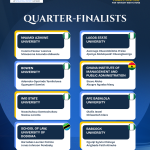Undoubtedly, the outbreak of COVID-19 has affected all facets of life, resulting in a near-total shutdown of economic activities across nations including Nigeria and it is therefore important to discuss SMEs economic recovery in the post covid-19 era as these institutions are germane but fragile.
According to the National Bureau of Statistics, with many Nigerians rendered unemployed by COVID-19, combined with lower volumes of exports such as oil and raw materials, Nigeria’s economy has contracted by 6.1% year on year; a trend that will potentially have major implications for post-COVID-19 economic recovery.
Consequently, we identify with the rest of the world in the struggle for economic recovery in the post-COVID-19 era. Presently, many countries around the world are shifting their focus to the development of small and medium-sized enterprises (SMEs) as the primary driver of economic recovery, and Nigeria should not be an exception.
In India for instance, SMEs account for 80% of national employment and 50% of the country’s Gross Domestic Product (GDP).
According to a report from the World Bank, SMEs represent about 90% of businesses and more than 50% of employment worldwide.
This notwithstanding, Nigeria still struggles to accelerate its growth through SMEs because of its weak intellectual property (IP) protection. IP refers to creations of the mind, such as inventions, literary and artistic works, designs, symbols, names, and images used in commerce.
In Nigeria, IP rights are deemed a distraction and not a thing of immediate concern by most SMEs. This, in turn to Nigeria’s economy, its, contributed to the decline of Nigeria’s economy.
This essay therefore examines the importance of SMEs role in the quest for economic recovery in the post COVID-19 era, and how IP protection can accelerate development.

The Importance of SMEs to Nigeria’s Economy
Globally, SMEs are largely recognized as the economic engine of growth and development due to their potential to create jobs, boost economic output, generate income, and reduce poverty. There are no universal definitions of SMEs, but they are most effectively understood by the role they play in each country.
The Small and Medium Industries Enterprises Investment Scheme (SMIEIS), however, defines SMEs to be any enterprise with a maximum asset base of N200 million.
A recent survey conducted by the National Bureau of Statistics (NBS) and the Small and Medium Enterprises Development Agency of Nigeria (SMEDAN) indicates that SMEs in Nigeria account for 48% of our gross domestic product (GDP), constituting about 96% of registered businesses and employ about 84% of the labour force.
However, given the high rate of intellectual property theft prevalent in the country, the burning question is: ‘how can SMEs survive and accelerate economic growth?
Importance of IP Protection For SMEs In Nigeria
IP protection is essential for SMEs in Nigeria, just as it is in other countries. Intellectual property can be acquired in Nigeria by way of copyright, trademarks, patents and industrial designs.
Presently, many nations are emerging prosperously due to their keen interest in IP protection. Singapore’s development in intellectual property for example, has attracted the presence of about 80 of the top 100 tech firms in the world.
Without adequate protection, SMEs will suffer economic losses, potentially reducing government revenue. According to an estimate by Emmanuel Onyeje, country manager, Microsoft Nigeria, Nigeria loses N47.5 billion yearly to IP theft.
There are many factors responsible for this, ranging from lack of awareness about IP protection, lack of enforcement, obsolete laws, and many more.
Trademarking, for example, is an important IP asset for SMEs. Trademarks as a marketing tool create a brand for a company. It helps to keep the image of a business in the minds of its consumers by differentiating their products from those of their competitors.
Sadly, however, research has shown that, despite the wealth that surrounds a registered trademark, over 80% of SMEs still fail to register their marks. Most SMEs erroneously believe that trademarks are meant for big firms only. This is part of the issue that was addressed by an erudite lawyer in ‘The Ultimate Insider’s Guide to Intellectual Property’. In his words, he said:
“We hear this from business owners all the time: “Oh, we’re too small. It’s too early. We’re still thinking. We’ll think about trademarking once we grow bigger.” Let me be blunt with you, this is utter nonsense on so many levels. You must not make trademarking decisions based on where your business is today. You must make these decisions based on where your business will be if it’s as successful as you hope it might become.”
SMEs with registered trademarks will find it easy to navigate the perilous process of transforming an idea into a commercially viable product. In recent years, consumers are now after brands and not the products to which they relate. Similarly, with IP protection, SMEs can extend their brand protection beyond national borders. Further, some international IP regimes already ratified by Nigeria like the Berne convention, and Paris convention will also be beneficial to SMEs if the requisite steps are taken for their domestication in Nigeria.
A well-managed IP system has the potential to protect national intellectual treasures, resulting in economic benefits for the nation. In 2015, the Business Action to Stop Counterfeiting and Piracy (BASCAP) noted that reducing IP theft by just 10% over four years could deliver billions of Naira in economic growth and create thousands of new jobs.
In the textile industry, the Nigeria Textile Manufacturers Association (NTMA) disclosed that Nigeria loses a staggering $325 million every year due to the invasion of cheap and counterfeit textile materials. This is the direct opposite of what was recorded in the 1980s, where Nigeria’s textile industry generated an annual turnover of US $8.95 billion.
This is a clarion call for the Nigerian government to establish enforcement agencies to combat infringement of intellectual property rights. A few years ago, the Singapore government established an enforcement agency under the Singapore police force known as the Intellectual Property Rights Branch. In 2018, the agency made 124 trademark raids valued at $6,258,038.80.
Nigeria with the support of organizations like the Standard Organization of Nigeria (SON) and Nigeria Textile Manufacturers Association can co-opt this procedure. In 2013, SON, together with NTMA, carried out a raid in Lagos leading to the seizure of over N20 million worth of counterfeit products.
In the fashion industry, designers are encountering significant difficulties in protecting their work. Recently, Nigeria’s fashion industry has guided itself toward international recognition, necessitating effective protection.
Designers such as Deola Sagoe, Duro Olowu, Adebayo Okelawal, and Amaka Oskwe have put the Nigerian fashion industry on the map. While our IP laws provide an avenue for designers to register their trademarks to cover the branding aspect of their fashion industry, most of these high-profile designers are still missing out on some other aspects of IP protection due to a seeming lack of information and knowledge.
Many designers are ignorant of the fact that different types of protection can reside in a single design. For instance, the artistic characteristics of a fabric design can be protected under copyright law since fashion is a pool of artistic work, while the ornamental or aesthetic part of the design can be protected under the Patent and Design Act.
A combination of copyright and industrial design protection will give the designer more bargaining power, especially in mergers and acquisitions, loan application, and IP rights assignment or licensing. Additionally, obtaining dual IP protection will help SMEs leverage their IP rights to access venture capital and other financing.
Furthermore, it is important for Nigeria to recognise and appreciate other important aspects of intellectual property rights that focus on areas of its economic advantage. Our IP laws do not cover assets like geographical indication, appellation of origin, and trade secrets.
Trade secrets are the backbone of many enterprises. If left unprotected, the possibility of their products being reproduced by competitors will be very high. A significant example that illustrates the benefits that await an SME that protects its trade secrets is the Coca-Cola company.
Coca-Cola made the choice to brand their recipe as a trade secret instead of patenting it, which would have led to the disclosure of the ingredients. The recipe has remained a secret for the past 86 years.
Conclusion
SMEs are responsible for a large number of products and innovative designs on the market today. Unfortunately, most SMEs often find it difficult to exploit their creativity due to lack of awareness about IP protection.
SMEs play an important role in the development of Nigeria’s economy and should be prioritized by the government. With effective IP protection, they are the perfect drive for economic recovery in the post COVID-19 era. Hence, rather than being seen as an obscure legal term, IP should be seen as a powerful tool for economic growth by SMEs.
Click Here to download the PDF of the article
References
Joe Duke, “ Small And Medium Industry’s Equity Investment Scheme as Funding Strategy for SMEs in Nigeria” (Research Gate, January 2010)
Yusuff Jelili Amuda, “Impact of Coronavirus on Small and Medium Enterprises (SMES): Towards Post Covid-19 Economic Recovery in Nigeria” (Academy of Strategic Management Journal, June 2020)
K.M. Waziri, The Role of Intellectual Property in Promoting a Modern State: Nigeria in Perspective” (Faculty of Law, Udus, May 2018)
Business Action to Stop Counterfeiting and Piracy (BASCAP), “Promoting and Protecting Intellectual Property Right in Nigeria” (The World Business Organization, July 2015)
Olisa Agbakoba, “Role of Intellectual Property for SMEs in the Nigeria Fashion Industry”- Link
<Accessed May 3 2021>
Business Action to Stop Counterfeiting and Piracy (BASCAP), “Promoting and Protecting Intellectual Property Right in Nigeria” (The World Business Organization, July 2015)
The Proshare Ecosystem, “Testile: Nigeria Loses $325m to Smuggling Annually” (Proshare Intelligent Investment, April 2020)- Link <Accessed May 5 2021>
K.M. Waziri, The Role of Intellectual Property in Promoting a Modern State: Nigeria in Perspective” (Faculty of Law, Udus, May 2018)
Business Action to Stop Counterfeiting and Piracy (BASCAP), “Promoting and Protecting Intellectual Property Right in Nigeria” (The World Business Organization, July 2015)
Karl Smallwood, “Is the Recipe of Coca-Cola Really Only Known by Two People?” (Today I Found Out, October. 2014)- Link
http://www.todayifoundout.com/index.php/2014/10/formula-coca-cola-know-two-people/ <Accessed December 01, 2021>





